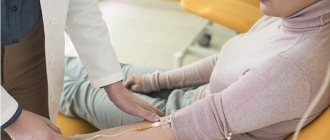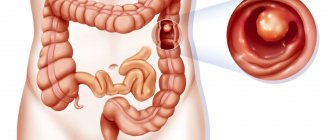What is Crohn's disease?
Crohn's disease is a chronic inflammatory disease of the gastrointestinal tract that can affect any part of it, from the mouth to the rectum.
The disease belongs to one of the types of inflammatory bowel diseases. Crohn's disease can be very debilitating and significantly reduce quality of life, and sometimes even lead to dangerous complications.
Symptoms
The disease is typical for patients of all ages. Symptoms usually begin to appear in childhood or late adolescence. Symptoms of Crohn's disease can vary in severity. They usually develop gradually, but sometimes they can occur suddenly.
Among the main symptoms:
- diarrhea,
- abdominal pain or cramps,
- blood in stool
- high fatigue
- decreased appetite and weight loss,
- heat,
- mouth ulcers,
- pain in the anal area.
Symptoms may be constant or come and go every few weeks or months.
People with severe Crohn's disease may also experience:
- inflammatory processes on the skin, mucous membranes of the eyes and joints,
- inflammation of the liver or bile ducts,
- stones in the kidneys,
- iron deficiency anemia,
- delayed growth or sexual development (in children).
How dangerous is Crohn's disease?
Unfortunately, Crohn's disease can lead to a number of serious complications:
- Intestinal obstruction. Crohn's disease can affect the entire thickness of the intestinal wall. Over time, scars may form and certain areas of the intestine may narrow, which significantly impairs the functioning of the organ. As a result, surgery may be required to remove the affected part of the intestine.
- Ulcers . Chronic inflammation can lead to open sores anywhere in the digestive tract, including the mouth and anus, as well as the genital area.
- Fistulas . Sometimes ulcers can lead to the formation of fistulas, which are abnormal connections between different organs. Fistulas can develop between the intestine and the skin or between the intestine and other organs. Fistulas near or around the anal area are the most common. When fistulas form in the abdomen, problems with absorption occur. Fistulas can also occur between loops of bowel, in the bladder, vagina, or through the skin. In some cases, fistulas can become infected and form abscesses, which can be life-threatening if left untreated.
- Anal fissure. This is a small tear in the tissue lining the anus or the skin around it. When fissures occur, the risk of infection increases significantly, and the condition is often associated with painful bowel movements and can lead to a perianal fistula.
- Malnutrition . Diarrhea, pain and cramping can make it difficult to eat normally or interfere with the absorption of nutrients in the intestines. In addition, iron deficiency or B12 deficiency anemia often develops against the background of the disease.
- Colon cancer. Crohn's disease, which affects the colon, increases the risk of colon cancer. General recommendations for colon cancer screening for people without Crohn's disease call for colonoscopies every 10 years, starting at age 50. However, Crohn's disease may require screening more frequently.
- Other health problems. Crohn's disease can cause or worsen anemia, skin diseases, osteoporosis, arthritis, gallbladder and liver diseases.
- Risks associated with taking medications. Some medications for Crohn's disease, which work by blocking immune system functions, are associated with a small risk of lymphoma and skin cancer. They also increase the risk of infectious diseases.
- Blood clots . Crohn's disease increases the risk of thrombosis.
How are inflammatory diseases and bowel cancer diagnosed?
The specialists of the multidisciplinary clinic “Trit” are proficient in all the techniques that allow them to identify even the smallest changes in the intestinal mucosa.
- An ultrasound examination is performed to detect thickening of the walls of the large and small intestine and narrowing of their lumen.
- Ultrasound with Doppler function allows you to check blood flow parameters.
- If necessary, an MRI OR CT scan is prescribed, as well as an x-ray examination.
- To detect blood in the stool, indicating the presence of bleeding in the gastrointestinal tract, laboratory tests are performed (including determination of fecal transferrin and hemoglobin).
The “gold standard” of research is a modern endoscopic technique, intestinal colonoscopy under anesthesia. If the patient has extraintestinal manifestations of the disease, doctors of relevant specialties - an ophthalmologist, dermatologist or rheumatologist - are also involved in the diagnosis.
Why does Crohn's disease occur?
The exact cause of Crohn's disease is unknown. It was previously believed that a certain diet and high levels of stress were the causes of the disease. But it is now known that these factors may aggravate, but not cause, the disease. Smoking, other gastrointestinal diseases and an imbalance of the intestinal microbiota can also aggravate the disease.
How does microbiota fight stress and depression?
Doctors identify two main risk factors for developing Crohn's disease: hereditary predisposition and a malfunction of the immune system.
- The immune system. Sometimes, when the immune system fights foreign microorganisms, an abnormal immune response can occur. In this case, the immune system can also attack the cells of the gastrointestinal tract.
- Hereditary predisposition . Crohn's disease is more common in people who have family members who also have the disease. However, most people with Crohn's disease do not have a family history of it.
Scientists also suggest that Crohn's disease may be caused by a virus or bacteria, but there is no evidence for this theory yet.
Who is at risk?
- Young people. Although Crohn's disease can begin at any age, most patients are diagnosed before age 30.
- People of Eastern European (Ashkenazi) Jewish descent. The incidence is also increasing among black people living in North America and the UK. It is important to consider that Crohn's disease can affect any ethnic group.
- People with a family history of Crohn's disease. If your parents or siblings (first-degree relatives) have the disease, your risk increases. One in five people with Crohn's disease has a family member with the disease.
- People who smoke. Cigarette smoking leads to more severe disease and a greater risk of surgery.
- People taking non-steroidal anti-inflammatory drugs. Although the drugs themselves do not cause Crohn's disease, they can lead to inflammation in the intestines, which makes the disease worse.
How to assess risks
The development of the disease involves genes that regulate various processes in the intestine. They are involved in inflammatory reactions and autophagy, the process of cell self-destruction. Associated genes also influence the interaction between the body and gut bacteria. You can find out if you have such genes using a genetic test.
What can you learn from a genetic test?
To date, scientists have also been able to describe the microbiota profile observed in Crohn's disease. The less similar your microbiota profile is to that of your disease, the lower your risks. The indicator is assessed on a scale from 1 to 10. A microbiota test will help you find out how far your microbiota is from the profile for Crohn's disease and whether you need to adjust your diet to avoid it.
In Crohn's disease, the ratio of opportunistic bacteria that trigger inflammation and beneficial bacteria changes. Also, the presence of beneficial bacteria - producers of butyric acid, which protects the intestines from inflammation - is often sharply reduced.
Advantages of endoscopic examination in a paid clinic
Colonoscopy under anesthesia is carried out after appropriate preparation - following a special diet and complete cleansing of the intestines with the help of potent laxatives.
- In a European-style clinic, the patient will receive detailed recommendations on balancing the diet, which will help them calmly, without weakness or discomfort, undergo the stage of fasting and cleansing the intestines.
- Modern equipment allows a highly qualified specialist to conduct an examination with pinpoint precision without damaging the intestinal mucosa.
- The systematic process will take no more than 20 minutes, after which the patient will wake up in the room without experiencing any negative sensations.
- Patients who have already undergone intestinal endoscopy note that their expectations of something painful and terribly unpleasant were absolutely not justified.
Be attentive to your health! If sudden intestinal problems do not go away within 2-3 weeks, consult a specialist.
| +7 (495) 134-06-66 Write to WhatsApp | Moscow, st. Kantemirovskaya 53, k1 | Mon-Sat: from 9 to 21, Sun: from 9 to 20 |
| +7 (495) 134-06-66 Write to WhatsApp | Moscow, Kashirskoe highway, 51, k3 | Mon-Sat: from 9 to 21, Sun: from 9 to 20 |
How is Crohn's disease treated?
To date, there is no complete cure for Crohn's disease, but there are a number of drugs and measures that indirectly alleviate the course of the disease. The most common treatment for Crohn's disease is medication, but sometimes surgery may be necessary.
These techniques can significantly reduce the symptoms of the disease and even lead to long-term remission. With treatment, many people with Crohn's disease can live normally with minimal restrictions.
Steroid drugs
Most people with Crohn's disease need to take steroids, such as prednisone, from time to time.
These medications may relieve symptoms by reducing inflammation. They are usually prescribed as tablets once a day, but are sometimes given as injections. The course of treatment usually lasts several months. The drugs may cause side effects such as weight gain, stomach upset, trouble sleeping, increased risk of infection, and slower growth in children.
Liquid diet
A liquid diet (enteral nutrition) may be appropriate for children and adolescents. The diet involves replacing the usual way of eating with special drinks containing all the necessary nutrients. Usually the diet is prescribed for several weeks.
What to do for constipation: 7 reasons and solutions
This option avoids the risk of growth retardation in children that can occur with steroid use. On average, enteral nutrition has few side effects, but some patients may experience diarrhea or constipation.
Immunosuppressants
These drugs are prescribed to reduce the activity of the immune system, and usually when steroids alone do not work. The drugs are prescribed in long courses over several months or even years. Side effects include malaise, increased risk of infections, and liver problems.
Biosimilar medicinal products
If other medications do not help, stronger medications, biosimilar medications, may be needed. The drugs are prescribed in long courses over several months or years to prevent relapses of the disease.
Biosimilar drugs are administered by injection or drip every 2-8 weeks. Side effects include an increased risk of infection, itching, joint pain, and fever.
Surgical intervention
Your doctor may recommend surgery if the benefits outweigh the risks or if medications don't work. Surgery can relieve your symptoms and prolong remission, but it also does not completely cure Crohn's disease.
The main type of surgery for Crohn's disease is resection, the removal of a small section of intestine. Sometimes an ileostomy may be necessary for an additional few months to allow the bowel to heal.
Colonoscopy of the intestine: are patients’ fears justified?
An illness diagnosed at an early stage creates the least amount of problems for the patient. Therefore, highly informative screening colonoscopy is included in government programs to combat colon cancer in the USA, Israel and European countries. Citizens of developed countries are constantly informed about the need for regular examinations for the prevention and early diagnosis of colorectal cancer.
The specifics of such an intimate procedure do not evoke the most positive emotions among Russians. Pain is a major deterrent even for those people who are fully aware of the need for testing. But is it possible to compare the sensations that arise during a colonoscopy with the torment experienced by patients suffering from already developed oncology!
It should be understood that gentle diagnostic technology, which can be performed under anesthesia, will allow you to avoid dangerous symptoms, frightening diagnoses and a solid set of diagnostic procedures in the future.
Will diet help in the treatment and prevention of Crohn's disease?
There is no evidence that any specific type of diet causes Crohn's disease. In this case, the attending physician may advise you to adhere to a certain diet if the disease has been diagnosed. This may help relieve symptoms or reduce their intensity. However, no diet, unfortunately, can save a patient from Crohn's disease.
Some guidelines to follow:
- Eat small meals 4-6 times a day.
- Don't forget about water. It is better to drink water slowly and not through a straw to avoid swallowing air and gas formation.
- Prepare meals in advance and have foods on hand that you tolerate well.
- Introduce new foods into your diet carefully, one at a time, in small portions.
- Avoid high fiber foods, raw vegetables and fruits, and caffeinated drinks.
- Use simple cooking methods - boiling, steaming, grilling.
- Keep a food diary to make it easier to track which foods you tolerate well or poorly.
How to eat during an exacerbation?
Unfortunately, for Crohn's disease, it is impossible to create a universal list of recommended or prohibited foods. It will be different for each patient; the attending physician will help you choose it. You can also focus on personal observations - note what suits your body and what does not.
What to avoid?
- High-fiber foods that are difficult to digest: fruits with skins and seeds, raw green vegetables (especially cruciferous vegetables - broccoli, cauliflower), whole nuts and whole grains.
- Products containing lactose: milk, cheeses and other dairy products.
- Non-absorbable sugars: sorbitol, mannitol and other sugar alcohols. They are found in sugarless chewing gum, candy, ice cream, and some fruits and juices.
- Sweets: pastries, sweets, juices.
- High-fat foods: fatty and fried foods, butter, margarine, coconuts.
- Alcohol and caffeinated drinks.
- Spicy food.
What is?
- Low fiber fruits: bananas, melon, cooked fruits.
- “Lean” protein: fish, lean pork, white poultry, soy, eggs and firm tofu.
- Refined grain products: potato or gluten-free bread, white pasta, white rice and oatmeal.
- Fully cooked, seedless, skinless, non-cruciferous vegetables: eg cucumbers, potatoes, zucchini.
How to eat during remission?
Since patients with Crohn's disease are not comfortable eating just any food, they may experience a deficiency of certain macro- or microelements. During remission, you should pay attention to these products:
- Fiber-rich foods: oat bran, beans, barley, nuts and whole grains (provided you do not have specific contraindications for this from your doctor).
- Protein: Lean meat, fish, eggs, nuts and tofu.
- Fruits and vegetables: Try to remove peels and seeds.
- Foods rich in calcium: collard greens, kefir, milk (if you are lactose intolerant, choose lactose-free dairy products or use the lactase enzyme).
- Probiotic foods: yogurt, kimchi, miso, sauerkraut and tempeh.
Forecast
Unfortunately, the disease cannot be completely cured, and there is no talk of complete recovery. The pathology persists throughout life against a background of regular alternation of remission and exacerbations. However, if you treat the disease correctly and in a timely manner, it will help to minimize unpleasant symptoms, alleviate the condition, maintain quality of life and avoid the development of dangerous complications.
Sources:
- Current data on Crohn's disease. Styazhkina S.N., Galyautdinova A.Sh., Mannanova D.R. StudNet No. 5, 2021
- Diagnosis of Crohn's disease in childhood. Doroshenko K.V., Tsupik I.S., Marukhno N.I. Pacific Medical Journal No. 4, 2021. p. 70-72
- Clinical and laboratory features of Crohn's disease in children. Kalatina Yu.E., Sorokin D.V., Volosnikov D.K. Pediatric Bulletin of the Southern Urals No. 1, 2021. p. 66-71
- The role of diet therapy in Crohn's disease in children. Paulino Sara, Diaz Jorge Amil. Pediatrics. Supplement to the journal Consilium Medicum No. 2, 2018 p.10-16
The information in this article is provided for reference purposes and does not replace advice from a qualified professional. Don't self-medicate! At the first signs of illness, you should consult a doctor.
Lettuce
A diagnosis of Crohn's disease does not mean the end of the salad treat. As long as diarrhea does not appear, it is possible to enjoy lettuce salad. Also known as Boston Bibb lettuce, a sub-head lettuce variety with tender greens, excellent flavor, a widely available light green lettuce that is much more tender and easily digestible than other salad greens.
Authorized Products
Diet No. 4B is suitable for constant nutrition of patients. The basis of her diet:
- Soups in a weak broth with cereals (except millet), vegetables and noodles. Of the vegetables, carrots, zucchini, pumpkin, potatoes and cauliflower are most often well tolerated, and if tolerated well, white cabbage and green peas are allowed, but in boiled form.
- Stale wheat bread, you can eat dry biscuits and biscuits.
- Choose lean meat (veal, beef, chicken, turkey) and prepare steam cutlets, meatballs and meat in pieces. Fish is also low-fat boiled, stewed or baked in foil without a crust.
- For side dishes you can try carrots, potatoes, pumpkin, zucchini and cauliflower. Prepare them boiled or steamed in the form of purees and casseroles. Some patients tolerate ripe tomatoes without skin well.
- Dishes from cereals (except pearl barley and millet) are prepared well boiled, first pureed, and then switched to crumbly porridges; boiled vermicelli is allowed. You can use instant water-based porridge for children, which is beneficial in its composition because it is enriched with vitamins and minerals. A specialized mixture for patients with IBD ( Nutrilon Pepti TSC ) is added to the finished porridge.
- Egg dishes (1-2 per day) - steam omelettes and soft-boiled eggs.
- Dairy products are excluded, but if well tolerated, you can drink kefir on a limited basis and add freshly prepared cottage cheese and butter to dishes up to 10 g per meal.
- Jelly and decoctions of blueberries, bird cherry, dogwood, quince, black currant, compotes with pureed fruits, jelly, soufflé of sweet berries, baked and mashed apples and pears are allowed, but it all depends on individual tolerance.
- You can drink herbal teas, rosehip infusion, weak tea, and still water up to 1.5 liters per day. You can add diluted fresh juices.
Table of permitted products
| Proteins, g | Fats, g | Carbohydrates, g | Calories, kcal | |
Fruits | ||||
| quince | 0,6 | 0,5 | 9,8 | 40 |
| pears | 0,4 | 0,3 | 10,9 | 42 |
| dogwood | 1,0 | 0,0 | 10,5 | 44 |
| apples | 0,4 | 0,4 | 9,8 | 47 |
Berries | ||||
| blackberry | 2,0 | 0,0 | 6,4 | 31 |
| blueberry | 1,1 | 0,4 | 7,6 | 44 |
Nuts and dried fruits | ||||
| dried pears | 2,3 | 0,6 | 62,6 | 249 |
| dried blueberries | 0,9 | 0,7 | 72,3 | 309 |
Cereals and porridges | ||||
| buckwheat (kernel) | 12,6 | 3,3 | 62,1 | 313 |
| semolina | 10,3 | 1,0 | 73,3 | 328 |
| oat groats | 12,3 | 6,1 | 59,5 | 342 |
| cereals | 11,9 | 7,2 | 69,3 | 366 |
| white rice | 6,7 | 0,7 | 78,9 | 344 |
Bakery products | ||||
| white bread crackers | 11,2 | 1,4 | 72,2 | 331 |
Confectionery | ||||
| Maria cookies | 8,7 | 8,8 | 70,9 | 400 |
Raw materials and seasonings | ||||
| dried bird cherry | 8,4 | 0,0 | 16,8 | 101 |
Dairy | ||||
| acidophilus | 2,8 | 3,2 | 3,8 | 57 |
Cheeses and cottage cheese | ||||
| cottage cheese 0.6% (low fat) | 18,0 | 0,6 | 1,8 | 88 |
Meat products | ||||
| boiled beef | 25,8 | 16,8 | 0,0 | 254 |
| boiled veal | 30,7 | 0,9 | 0,0 | 131 |
| rabbit | 21,0 | 8,0 | 0,0 | 156 |
Bird | ||||
| boiled chicken | 25,2 | 7,4 | 0,0 | 170 |
| turkey | 19,2 | 0,7 | 0,0 | 84 |
Oils and fats | ||||
| butter | 0,5 | 82,5 | 0,8 | 748 |
Non-alcoholic drinks | ||||
| mineral water | 0,0 | 0,0 | 0,0 | — |
| green tea | 0,0 | 0,0 | 0,0 | — |
| black tea | 20,0 | 5,1 | 6,9 | 152 |
| * data is per 100 g of product | ||||







